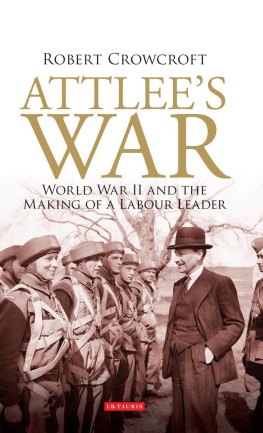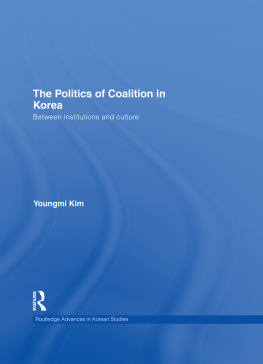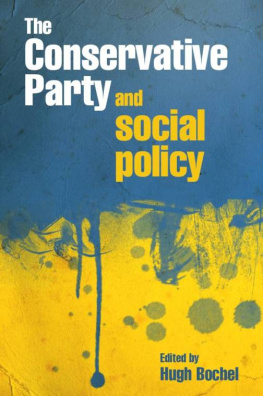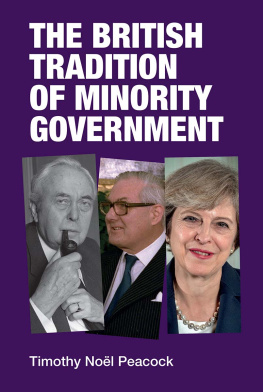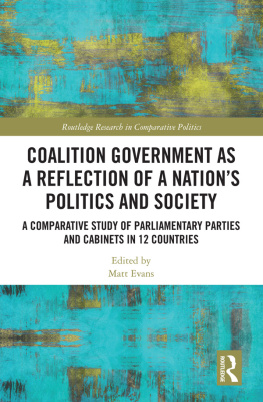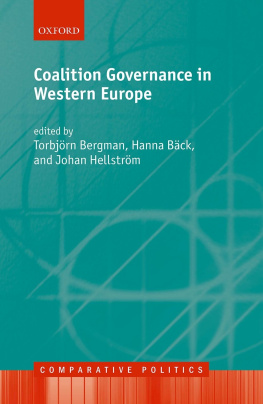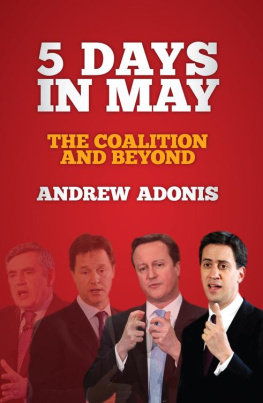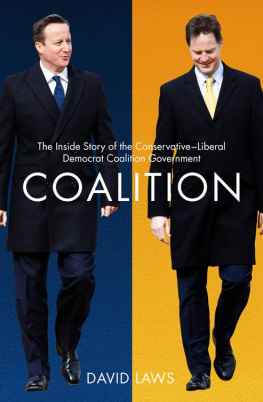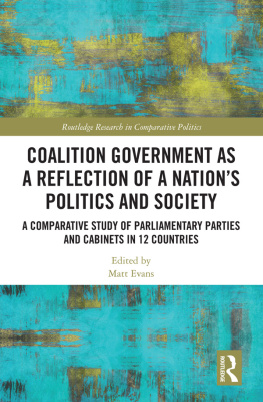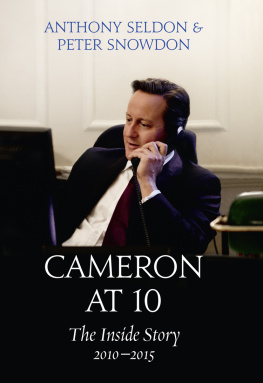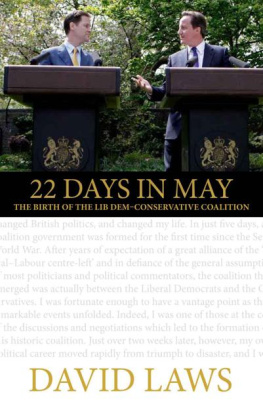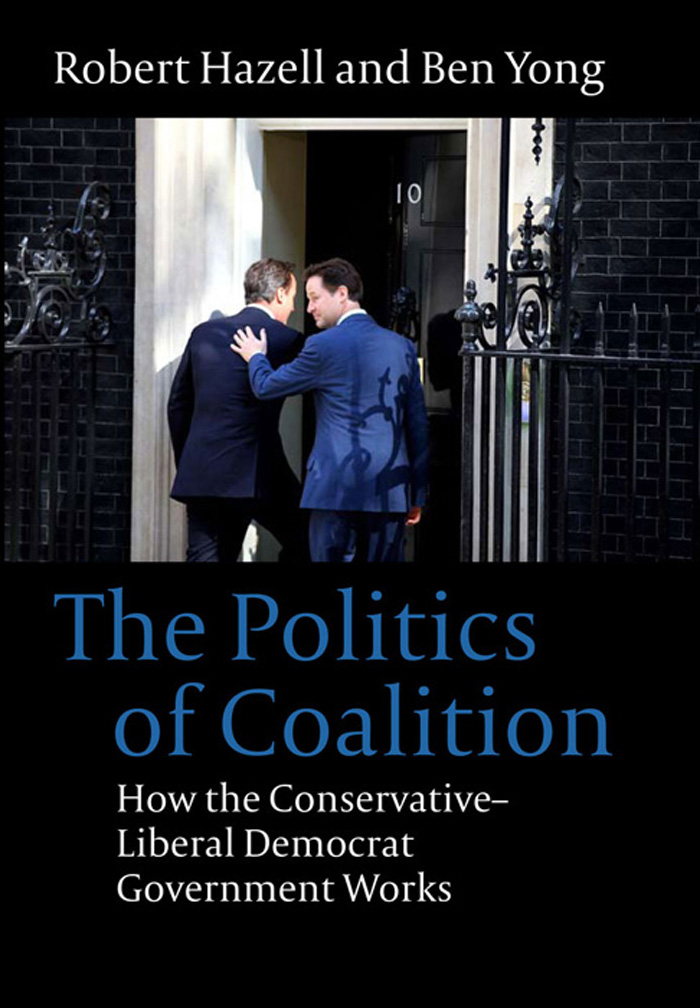THE POLITICS OF COALITION
The Politics of Coalition is the tale of two parties embarking on the first coalition government at Westminster for over 60 years. What challenges did they face in the first couple of years, and how did they deal with them?
With the authorisation of Prime Minister David Cameron, Deputy Prime Minister Nick Clegg and the then Cabinet Secretary, Sir Gus ODonnell, the Constitution Unit has interviewed over 140 ministers, MPs, Lords, civil servants, party officials and interest groups about the Coalition and the impact coalition government has had upon Westminster and Whitehall.
The Politics of Coalition tells how the Coalition has operated in the different arenas of the British political system: at the Centre; within the Departments; in Parliament; in the parties outside Parliament; and in the media. It will be of interest to politicians, policy makers, academics, students and anyone interested in how the UK Coalition works in practice and not just in theory.
The Politics of Coalition
How the ConservativeLiberal Democrat Government Works
Robert Hazell and Ben Yong

OXFORD AND PORTLAND, OREGON
2012
Published in the United Kingdom by Hart Publishing Ltd
16C Worcester Place, Oxford, OX1 2JW
Telephone: +44 (0)1865 517530
Fax: +44 (0)1865 510710
E-mail:
Website: http://www.hartpub.co.uk
Published in North America (US and Canada) by
Hart Publishing
c/o International Specialized Book Services
920 NE 58th Avenue, Suite 300
Portland, OR 97213-3786
USA
Tel: +1 503 287 3093 or toll-free: (1) 800 944 6190
Fax: +1 503 280 8832
E-mail:
Website: http://www.isbs.com
Robert Hazell and Ben Yong 2012
Robert Hazell and Ben Yong have asserted their right under the Copyright,
Designs and Patents Act 1988, to be identified as the authors of this work.
All rights reserved. No part of this publication may be reproduced, stored in a retrieval system, or transmitted, in any form or by any means, without the prior permission of Hart Publishing, or as expressly permitted by law or under the terms agreed with the appropriate reprographic rights organisation. Enquiries concerning reproduction which may not be covered by the above should be addressed to Hart Publishing Ltd at the address above.
British Library Cataloguing in Publication
Data Data Available
ISBN: 978-1-84946-310-2
Typeset by Hope Services, Abingdon
Printed and bound in Great Britain by
TJ International Ltd, Padstow, Cornwall

Contents
Ben Yong
Eimear OCasey
Ben Yong
Robert Hazell
Peter Waller
Ben Yong
Ben Yong
Brian Walker
Robert Hazell
Peter Waller and Ben Yong
Robert Hazell
Preface
The origins of this book lie in two previous pieces of work by the Constitution Unit. The first was Ben Seyds 2002 report, Coalition Government in Britain: Lessons from Overseas. The second was a project we embarked upon in 2009, preparing for the possibility of a hung parliament after the 2010 general election. That led us to work closely with the then Cabinet Secretary Sir Gus ODonnell and his officials. So it was understandable when a coalition government was formed in 2010 that we should want to revisit Ben Seyds earlier study, and to ask the Cabinet Office for their help and cooperation.
Sir Gus ODonnell responded positively, and we wish to thank the Prime Minister David Cameron, the Deputy Prime Minister Nick Clegg and the Cabinet Secretary for generously agreeing to allow us access. It was an extraordinary privilege to be permitted to observe the inner workings of the Coalition, and we are very grateful to all the ministers, senior officials, parliamentarians and special advisers who kindly agreed to be interviewed. We hope that they recognise the picture that we have gradually built up of how the Coalition operates, seen from the inside; and that they feel the time they kindly gave us was justified. We are also grateful to the members of the political parties, interest groups and media commentators who gave us interviews.
This was a daunting project in several respects. There is almost no literature on coalition government in Britain, apart from the honourable exceptions mentioned in chapter one. In academic literature generally, there are few studies of how coalition government works in practice. That is in part because of difficulties of access, which Sir Gus and his colleagues so generously overcame; and in part because of the academic predilection for theoretical modelling, for studying the formation and termination of coalitions, but not their actual operation.
This book attempts to be both an academic study and a practical study aimed at policy makers, with the risk of falling between the two. And it is a study of the Coalition only in its first 18 months. We fully recognise that some of our conclusions may be overtaken by subsequent events; but it seemed too important to wait until the end of the Coalition before attempting to learn any lessons about its operation.
The Nuffield Foundation were willing to back the risk, with their long record of supporting academic research with a strong policy focus. We are grateful to them and to their Deputy Director, Sharon Witherspoon, for agreeing to fund our research; and for hosting a seminar of UK coalition experts to discuss some of our draft chapters in November 2011.
We originally planned to interview 60 people for the study, but in the end interviewed almost 150. That we managed to do so was largely thanks to Peter Waller and Brian Walker, both honorary Senior Research Fellows of the Constitution Unit. Peter Waller was formerly a senior civil servant, and Brian Walker in the BBC, and they brought to the project their deep knowledge of how government works, and how it interacts with the media. They conducted many of the interviews, and kindly wrote the chapters on Whitehall departments, and the Coalition and the media. Chapter 2 was written by Eimear OCasey, who joined the Constitution Unit partway through the project, and was tasked with pulling together the data we had collected on how coalitions work in other countries. She quickly did that and more, proof reading and copy editing all the chapters for which we are very grateful. The final member of the project team was David Laughrin, also a former senior civil servant, and now Fellow of the Ashridge Public Leadership Centre; he generously helped with some of the Whitehall interviews, attended our monthly project meetings, and offered wise comments on our progress and our draft chapters.
All the chapters were sent in draft to several reviewers. We are grateful to all those who kindly commented on our work in progress. Several of our reviewers were also interviewees, and to protect their anonymity we do not name them all here. But those we can thank publicly include Sir Christopher Foster, who nobly read a copy of the entire manuscript; Nick Anstead, Tim Bale, Sir John Elvidge, Oonagh Gay, Chris Hanretty, Andrew Ladley, Meg Russell, Jean Seaton, Ben Seyd and Nick Timmins.



